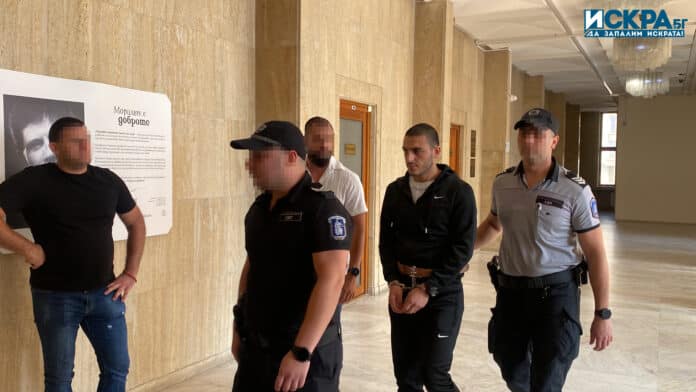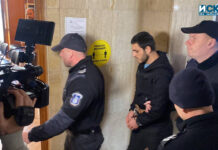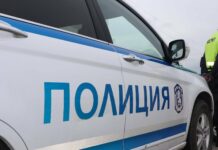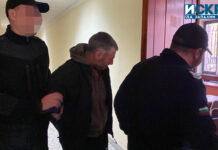
Today, during the hearing against the Syrian Omar Adnan, who drove the bus that killed the two policemen at Trapezitsa junction in Burgas, one of the three operatives on duty at the operational unit of the Burgas Police Department was questioned. In the courtroom, Kalin Chavdarov said that at around 04:50 on 25 August 2022, police officers Atanas Gradev and Yordan Iliev with a motor patrol with call sign Birch 1 to the First Regional Police Station reported to the duty section, and subsequently left to take blood for analysis.
At about 04:51, a signal was received from the Border Police Station /BPS/ about a bus, white in colour, which had not stopped at a stop stick signal given by border police officers at the Krushevets and Poda checkpoints, and was travelling in the direction of Burgas. In the meantime, the operative has transmitted the information on air. According to him, perhaps after about 2 minutes from Birch 1 they transmitted that they were at „Trapezitsa“ and continued:
“I returned a call to the GPU to find out where the bus was. It became clear that a white bus with Turkish registration was driving along Trapezitsa. I conveyed the same on air during the conversation with the GPU. I picked up the receiver again and the colleagues conveyed that our vehicle had been hit by the bus. I searched for them /editor’s note: the dead policemen/, but got no answer. Additionally, my colleague from the GPU told me that the vehicle was under the bus and between the bus stop. I sent teams to check the situation. I called 112 so they could send a fire team to the scene. Subsequently, I realised that there was no sound or movement from the vehicle.”
Asked what Gradev and Iliev should have done, Chavdarov replied:
“They should have headed for the island between the traffic lanes, signalled to stop with a baton and, if they could, stopped it.”
Asked by the magistrates how the bus could have stopped when it had not stopped up to that point, the policeman replied, “I didn’t know how reliable the information was. How can I order specific action to be taken when I don’t know what will happen?”
The police officer was also asked whether the information from the GPU contained information that the bus was travelling at high speed, to which he replied, “I don’t think it was said that the bus was travelling at high speed. I don’t remember. /…/ I did not tell my colleagues that the bus was travelling at a dangerously high speed and I did not give orders. There is a record and it can be established that this was the case.”
Prosecutor Dimitar Uzunov asked the witness to answer a few clarifying questions. The first was how many people were at work on the unfortunate night and what duties each of them had. Chavdarov said:
“Three of us were at work. /ed. the witness named his colleagues/. Our duties are too many.”
The second question. “Is there such a system and is it real-time?”
“No one had such obligations. We have such a real-time surveillance system. It covers the Trapezitsa roundabout. /…/ We could monitor the roundabout in real time. I can’t answer why nobody was watching. Nobody thought about cameras. I’m not sure why we didn’t watch them. There are 30 cameras at Trapezitsa. I don’t think that within 2-3 minutes they can all be viewed”, the policeman said.
And to the question of the state prosecutor how many cameras are directed to the g.k. “Meden Rudnik” because there was information that the bus was coming from there and not from „Edrin“ or the centre, the police officer failed to answer. Asked where his colleagues were at that hour, he said his other was resting in the next room at the time.
“We’re talking about a three-minute period. We’d better get the job done as quickly as possible …”, Chavdarov said, stressing that he did not have enough time. He said he had literally passed on the information from the GPU-Burgas. He was swept to repeat the information received, namely:
“We received information from the duty GPU-Burgas that a white bus did not stop at the signal given at the checkpoint „Krushevets“ and checkpoint „Poda“. At the moment the colleagues from the border guards are entering Burgas.”
“I passed on the air the information. The colleagues reported that they were at the roundabout. I have not given any more information except that a bus is approaching and orders.”
Prosecutor Uzunov asked if there was a technical device in the patrol car to force the stopping of vehicles, to which the police officer said there should have been, but there was no way of knowing if it was equipped. This was monitored by „the colleague who does the day and night shift briefing“. He said they were used when there was evidence of a crime being committed.
And why wasn’t it used?
“In order for these tools to be used you need technological time and there was none”, he explained.
It was pointed out that the border and police officers did not have a common communication, but it was done through the duty officer. They do not use a single cleanliness.
“I did not issue any orders. During a conversation with the GPU duty officer, I came to know about the traffic accident. /…/ I called my colleagues again at 04:54, and I was told: ‘Pass on to your colleagues that the bus is white in colour and is at Trapezitsa.’ I relayed that there were officers there, at Trapezitsa, and after a while I received information that our vehicle had been hit by the bus. So both he and I called for an ambulance and the fire brigade. /…/ Yes we have the power to order. We take reports from citizens from 112 from the internal phone or other cases like this was.”
It was reiterated that Iliev and Gradev were expected to give a stop stick and if the bus did not stop, to yield a route of traffic. To this the prosecutor asked:
“How long are we going to pass stop sticks? Yambol? Sofia or escort him to Serbia?”
According to Chavdarov, there was traffic in the area at 5:00 a.m. and because of that the bus had to be forcibly stopped at a suitable location, which he believed was outside of town. To which Prosecutor Uzunov stressed that he had read all the materials in the case several times and evaluated them. He was impressed with the words:
“We observe, we follow! We observe, we follow! How far will we follow them? The only ones who refused to follow them are the dead!”
“We had no further information to stop him. I need further information that a crime has been committed to order an enforced stop”, the officer said.
The case was subsequently reported to the then director of the Burgas Police Department, Kaloyan Kaloyanov. Chavdarov said he would act the same way again with the information available. He had the same duties and powers as his colleagues from the DGP-Burgas. In his words, the police officers could have put the technical means for forced stop at their own discretion.
Judge Tsveta Popova noted that after all, 3 minutes is not a small amount of time either – it is 180 seconds that the witness, in her opinion, could have talked to his colleague about what could be done and a decision could be made, because it was a critical situation in which a bus twice failed to comply with police orders. Her colleague added that the police on duty were not an agency to relay information and asked, “Did you not consider that the situation required a quick decision rather than relaying information?” Chavdarov stressed:
“I did not assess the particular situation. I have judged on this information to act in this way.”
“Isn’t it enough that he didn’t stop at two checkpoints?” the magistrates stressed, and the police officer said, “I can’t answer why I didn’t make a decision.”
Questioning of more witnesses continues today. Employees of the Registration and Reception Centre in Harmanli are expected to testify in court.










[…] The prosecutor in the case against the Syrian who killed policemen: How long are we going to hand ou… […]